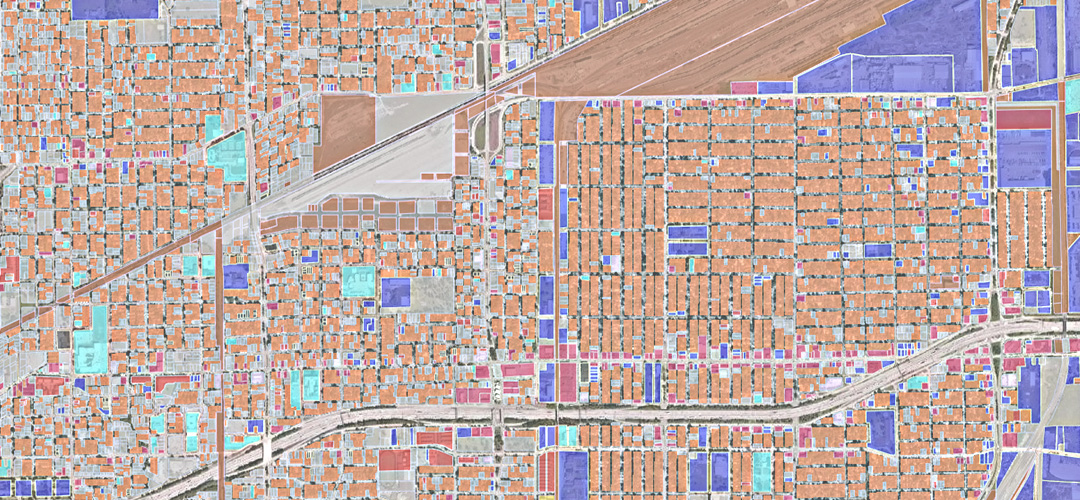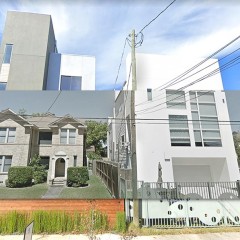Houston—usually criticized for its lack of zoning—has done a few things right, which Gray dedicates an entire book chapter to explain. As Gray admits, it remains as segregated as many other cities, but Houston has also been able to build much more housing in the central city. It also manages to exert some influence over development patterns through an emerging set of rules, from parking minimums to transit-oriented development guidelines, and it’s getting better at working around a lack of zoning to encourage better planning practices.
The Urban Edge invited Gray to talk about the lessons Houston offers, particularly as it continues to face a housing-shortage problem and challenges with industry and environmental concerns. The interview has been edited for length and clarity.
You write that Houston’s success stems from a compromise among some of the city's big neighborhoods. What was that compromise?
Houston is the only major American city that held a citywide referendum on zoning. The city actually held three, and it failed all three times. Most U.S. cities didn't hold referenda on zoning; it is just kind of quietly adopted.
Part of what made this possible was that certain groups that might have had extreme preferences for zoning—some of those neighborhoods that wanted to establish residential zoning districts—were effectively able to get the city to take on the responsibility of enforcing their deed restrictions.
On the one hand, deed restrictions come with all the costs of your typical R1 (single-family residential) zoning, as those areas are essentially locked off from growth and change over time and do result in segregation. On the other hand, giving those groups some of the restrictions that they wanted probably helped the city avoid a framework of zoning that would have constrained growth citywide.
Land use planning is a no-perfect-solutions-policy space. You're not going to get everything you want, and there are downsides. But I think the compromise that Houston struck ended up being better than most of the zoning regimes that other cities adopted at the urging of those same groups.
There's another great book about Houston, “Land Use Without Zoning,” by Bernard Siegen. He looked at the demographics of who voted for and against zoning, and it's very telling. Lower-income and moderate-income households voted pretty much overwhelmingly against zoning. Those are people who don't really have a lot of power as landowners.
It tends to be policy elites who maybe have a strong preference for R1-style zoning in their neighborhood who do have a lot of say in those conversations. But the referenda put it out to the public and actually asked people what they wanted. I think the average person saw it for what it was, that it was something that would make it much harder to build and would institutionalize segregation, and not really solve the problems that people actually care about, like environmental concerns.
Many cities are revisiting zoning, particularly the rules that made it all but impossible to build anything but single-family homes in some areas. What does Houston’s experience offer to that larger conversation?
The main benefit of non-zoning in Houston is that it makes it much easier to grow and change over time. Zoning essentially puts cities in a straitjacket. Zoning is doing two things: segregating land uses and restricting density. As I point out in the book, Houston has policy elements that touch on both of those, some of which I actually think is appropriate. But the general freedom from those types of restrictions is a huge part of why Houston has remained this relatively affordable and extremely diverse city. Despite explosive population growth and economic growth, the city can adapt, and the city can reinvent itself in a way that very few other cities can.
Houston made a lot of the same planning mistakes every U.S. city made in the 20th century; it’s just that zoning was not one of them. And I think Houston is improving at a faster rate than probably any other American city, from a planning perspective. Look at the bicycle master plan and some of the investments being made in bicycle infrastructure. Look at the mass transit redesign. Look at the Buffalo Bayou Park, probably one of the best public spaces built over the last generation.
Houston certainly is not an ideal city. But the city's improving at a really rapid clip. And it stands in stark comparison to Los Angeles, where zoning just sucks the air out of the room in planning discussions.
So many of these other cities are having these huge fights over single-family zoning, or they're having huge fights to allow residential in commercial areas and huge fights to legalize “missing middle” housing. Of course, Houston can still do more to make it easier to build that, but the baseline that it is working from is that a lot of these policies just don't exist, so you can build more housing a lot quicker here.
Houston was able to build way more infill housing than some cities in recent years. But we also know that Harris County needs close to a half-million more affordable units for people who live here now. How does Houston help close that gap since the barriers to building are already less stringent?
Zoning abolition is a necessary—but not sufficient—condition for solving a whole bunch of these other problems. You do need interventions; you need to line up public funds, and you need to have smart planning to solve a lot of other issues. A lack of zoning does not mean a lack of planning.
Houston has been able to solve some housing challenges, like veteran homelessness, and soon homelessness overall, because when you have the capacity for housing abundance, it just becomes easier to solve all these other problems.
With income-restricted housing in particular, markets are not going to provide that. You do need subsidies for it, or preferential treatment in terms of taxes and options on public land. The work that Houston is doing on community land trusts—buying up property and handing it to a land trust and placing a deed restriction on it for housing development—is really encouraging.
But for much broader solutions, you have to have Section 8 fully funded. You can't have waitlists for Section 8. One of the great things about Houston is there's this incredible housing elasticity—more housing tends to get built as soon as the demand increases. In the typical zoned city, the problem really is much more about supply constraints. But in Houston, there might be plenty of units available, but they are only affordable if a tenant can get a voucher.
Zoning board hearings can give the public varying degrees of influence over development—sometimes with good results, sometimes with bad. For a city that gives up zoning, what becomes the role of the public voice in those debates?
The public should have a huge amount of say when you're developing a larger framework for the city and when you're deciding what are the big investments we're going to make, the policies we're going to adopt, and what are the programs we're going to prioritize.
This type of public process is really valuable. When you do it at the comprehensive “General Plan” stage, planners really can go out and make sure they’re talking to a broad, representative sample. You can have not just that public hearing, but design charettes, surveys, and focus groups, you can actually get a real sense of the community values and their vision. But in most cities under a zoning regime, planning turns into a very reactive, combative situation where public input happens on a project-by-project basis.
It's purely reactive, and it’s not planning. It’s the opposite of planning, actually. We also know, totally unambiguously, that the type of people who go to zoning hearings to share their opinions on proposed developments are not representative of the broader community, and they tend to be much wealthier, and their preferences drive the process.
There can and should be more conditions on new development that balance public interests. The best possible way to do this would be to set clear standards: If you're going to build a project above some level, you need to help us with certain investments in infrastructure and the public realm. The temptation in the pro-growth Sun Belt is to not ask for anything because we don’t want to upset developers. You don’t want to set it so high you never get new investments, but not so low that the public has to foot the bill.
Development is one thing, but a lack of zoning also seems to make it challenging to have locally set limits on undesirable uses near where people live. Where does that fit in a post-zoning city?
I hear this so often. People might say, “Don't you need zoning to make sure there's no oil drilling in people's backyards?” No, but you do need a law saying no oil drilling in your backyard. You don't also need to adopt a system that says 75% of the city is only going to be single-family homes on two-acre lots and you can't have a corner deli in a neighborhood.
A century ago, before the rise of zoning, we were very comfortable doing this. We would say no slaughterhouses in certain areas, no tanneries. You need strong regulations to limit specific impacts on people and especially intense, heavy industrial uses, or sexually-oriented businesses. Having incompatible uses alongside one another is a complicated problem. Each one requires good rulemaking, and zoning is just the worst possible way to solve it.
For proposed uses moving forward, you can have buffer laws with a quarter-mile or some appropriate distance. But where you have existing built conditions, where it's residential next to industry, it's very hard to fix that, unless you're going to eminent domain properties, which is very costly and, for very good reasons, legally very difficult to do. So you have areas where these incompatible neighbors have emerged.
With the environmental elements of industry, the appropriate place to be regulating these is at the federal or the state level. Municipal governments don't really have a lot of capacity to engage in real emissions regulation. But you do need tighter regulations of the impacts to limit or prevent the spillover effects that these are having on neighbors.
Another aspect of this is getting neighbors and industry to have that conversation together. This is kind of an underrated role for planners—they can set up these conversations and come up with workable compromises. Residents don't want to be next to a polluting industrial use, and the polluting industrial use doesn't want me next to them, because residents are a headache and a potential legal cost for them. Both sides have some incentives to come up with solutions.
Longer term, we want frameworks where we can have this type of interaction where users naturally separate from each other. When people do misbehave, rules kick in to deal with that problem. That's a much more complicated project, but this is the land-use planning project that I'm inviting planners to undertake.
Zoning hasn't gotten us what we want, and it has created some harmful outcomes in terms of segregation and inequality. Let's start that next project of figuring out what comes next.


